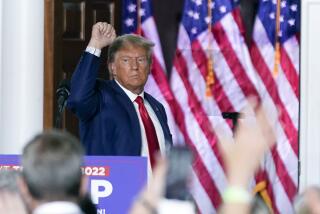Gorbachev Power Plan Fuels Debate : Reform: An effort to beef up the Soviet president’s authority sparks fears of a dictatorship.
MOSCOW — Debate is growing in the Soviet Union over President Mikhail S. Gorbachev’s proposals to strengthen the presidency, with some warning that the Kremlin may be creating legal mechanisms that eventually could turn the country into a dictatorship.
Others argue that the Soviet Union is being transformed so radically and quickly that it threatens to slide into chaos unless the president is given broad new powers to control the changes.
New details emerged this week about the extent of the authority Gorbachev hopes to see vested in the presidency, including the power to declare a state of emergency in any area even without the approval of regional leaders and the right to override legislation passed by parliaments in any of the republics.
The proposed constitutional changes to beef up the role of the presidency have been presented to deputies on a Supreme Soviet committee that views draft legislation in advance, and the proposals are expected to come soon before the entire Congress of People’s Deputies, or Parliament, which has the power to enact constitutional amendments.
Gorbachev became chairman of the Presidium of the Supreme Soviet in 1988, making him also the national president. It is his post as general secretary of the Communist Party that gives him his authority, but as the party loses power, Gorbachev is seeking to dramatically revise that formula.
Foreign Minister Eduard A. Shevardnadze told Secretary of State James A. Baker III earlier this month that the party leadership decided it was necessary to increase the authority of the office of president if Gorbachev is to be able to overcome “obstacles” slowing perestroika , his program of economic and social reform.
A number of officials have said that 1990 is a crucial year for the future of perestroika but that conservatives are still standing in the way of some reforms, particularly of the country’s economic system, which they fear would represent too great an ideological break with communism.
In addition, some officials have complained that Gorbachev does not have enough authority to deal effectively with ethnic unrest that has swept the country at a dizzying rate.
When he recently signed an order sending troops to the southern republic of Azerbaijan to stop anti-Armenian pogroms and what the Kremlin described as a nationalist uprising--a move many in the nation thought was long overdue--he had no clear constitutional right to do so.
But some fear that giving the president these vast new powers may be going too far without the proper checks and balances. Their concern about an abuse of power is not focused on Gorbachev as much as it is on the leaders who might follow him, the critics say.
Others believe that the Communist Party leadership, which developed its plan only earlier this month as part of an effort to restructure the government, is trying to get it approved by legislators too quickly, without needed debate and consideration.
“I am rather worried by the undue haste with which this is being pushed through,” said Anatoly Sobchak, a legislator from Leningrad.
“We need to be sure to create a balance of power,” Sobchak said in the weekly Moscow News, published Wednesday. “Otherwise, we face the dangerous possibility of establishing a dictatorship.”
Sergei Alexeyev, chairman of the committee that considers draft laws before they are submitted to the Supreme Soviet as a whole, disagreed.
He said he supports strengthening the presidency as much as possible both to help Gorbachev in the face of his anti-reform opponents and to lead to greater political organization in the country.
The new system approved by the Central Committee this month--under which the Communist Party is no longer to be all-powerful, and could share control of the country with other parties--may lead to confusion and even disintegration into nationalist groups unless the president is made the nation’s clear leader, Alexeyev said.
“It is as though our country were in a region threatened by a landslide, and I would like to get out of this situation as soon as possible,” Alexeyev told Moscow News. “Delay could lead to the collapse of the state and the country.
“Real power must belong to a strong institution which would stand above all the political parties and political infighting,” he said.
But Sergei Stankevich, a member of Alexeyev’s committee and prominent liberal legislator, said the planned changes do not provide enough checks and balances for the president’s power and predicted the proposals will have a difficult time getting approved unless they are amended.
“The leadership seems to have sent this document out in great haste, apparently in an effort to get discussions on it under way,” Stankevich said in an interview. “But I definitely cannot support the proposals in their current form, and I will actively fight against them.”
Under the current draft changes, the president initially would be elected by the 2,250-member Congress of People’s Deputies for a limited term while preparations are made for the first direct, nationwide elections of a president. The country’s leader would then serve a six-year term, Stankevich said.
More to Read
Sign up for Essential California
The most important California stories and recommendations in your inbox every morning.
You may occasionally receive promotional content from the Los Angeles Times.










